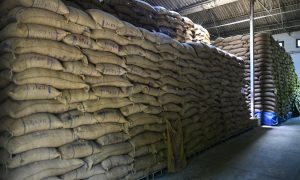CO2 pipelines would be a boon for ethanol. But some question if they’re really a climate solution

Jeff Reints only has to look out across his field to see where most of his corn ends up.
“We’re directly west of the Shell Rock POET ethanol plant approximately a short mile away,” he said while walking through corn stalks left from last year’s harvest.
Ethanol is a fantastic market for his corn, Reints said.
But when he found out the nearby ethanol plant would be a part of a proposed pipeline to carry away carbon dioxide, he was concerned. When he learned the pipeline would run underneath his northeast Iowa farm, he became staunchly opposed.
“This is some of the best farmland the good Lord has entrusted us with to be stewards of,” Reints said. “It’s just a shame to think that just for private gain, that they’re going to put that scar across our land.”
Three proposed pipeline projects would travel through Iowa, Minnesota, Nebraska and South Dakota, taking CO2 from ethanol plants and sending it into Illinois and North Dakota where it would be stored underground. The Biden administration is offering big tax incentives to help the U.S. reach net zero by 2050, which some ethanol proponents say are critical for the industry.
Farmers across the Midwest are fighting the carbon dioxide pipelines — largely over property rights. At the same time, environmentalists are raising concerns over whether carbon capture is the best way to curb emissions, especially compared to other strategies in the energy and agricultural sectors.
‘It’s life or death’
Summit Carbon Solutions, Navigator CO2 and Wolf Carbon Solutions — the three companies proposing to capture CO2 from Midwest ethanol plants and pipe it underground — say the projects will lower ethanol’s carbon emissions and help the farming economy.
Monte Shaw, the executive director of the Iowa Renewable Fuels Association, said the state either needs to be friendly to carbon pipelines or risk devastation for its corn growers and ethanol plants.
“If Iowa screws this up, we’re in big trouble,” Shaw said. “We will absolutely lose a huge chunk of our industry and put the Iowa ag economy in a tailspin.”
Carbon capture and clean fuel production tax credits are promised in the Inflation Reduction Act, a “game changer” for ethanol, Shaw said. It’s expected that ethanol plants that get those tax credits will be able to expand their production. But in order to qualify, the fuel that ethanol plants produce needs to meet certain emissions standards.
California and some other states have fuel standards that are pushing ethanol to lower its carbon emissions. With carbon pipelines, Shaw said, Iowa ethanol plants would survive a critical turning point in the industry’s history. Without pipelines, the state’s ethanol business could be doomed.
“It will create winners and losers,” Shaw said. “It will create plants that stay in business and plants that go out of business. So when we say that it’s life or death for many ethanol plants, that is an honest reality of where we’re at.”
A recent report, paid for by the Iowa Renewable Fuels Association, claims if Iowa ethanol plants are not able to participate in carbon capture pipeline projects but ethanol plants in neighboring states can, 75% of Iowa’s ethanol production would be lost to those states in the next five to 10 years, many ethanol plants would shut down, and Iowa’s ethanol industry would lose more than $10 billion a year without carbon capture in the state.
Ethanol is huge in Iowa.
The state is the largest corn producer in the nation and half of Iowa’s corn is used to make ethanol, mostly for gasoline fuel blends.
Yet Reints and many other farmers, as well as environmentalists, say they don’t buy the narrative that ethanol will shrivel up without carbon pipelines. Some point to better ways to sequester carbon or cut it altogether.
A solution to climate change?
The proposals are creating unusual alliances between farmers, such as Reints, who are concerned about property rights and safety, and environmentalists who question whether sequestering CO2 from ethanol is the best way to cut emissions.
In February, farmers from across Iowa gathered at the Iowa State Capitol for a rally calling lawmakers to ban eminent domain, the power of the government to take private land for the carbon pipelines.
Jess Mazour, the conservation program coordinator for the Iowa chapter of the Sierra Club, helped organize the rally. She argues carbon pipelines are not a real solution to climate change.
“There are tried and true ways to solve our climate crisis that are better uses of our public tax dollars than this questionable technology that puts risky pipelines in our backyards, that destroys farmland,” Mazour said.
One way to combat climate change in the ag sector would be for farmers to focus on keeping carbon in the ground, Mazour said. That includes planting more cover crops that enhance soil health and store carbon in the soil.
Asked if carbon pipelines should be a part of efforts to cut greenhouse gas emissions in general, Mazour said she doesn’t see it.
“I think rather than putting a Band-Aid on emissions, let’s stop burning them in the first place,” she said.















